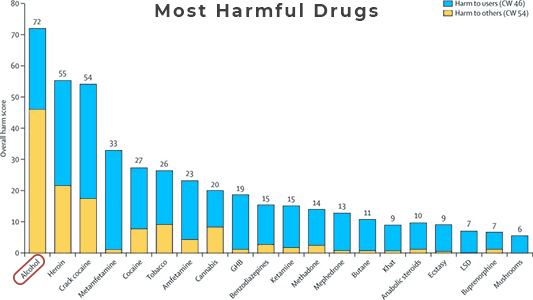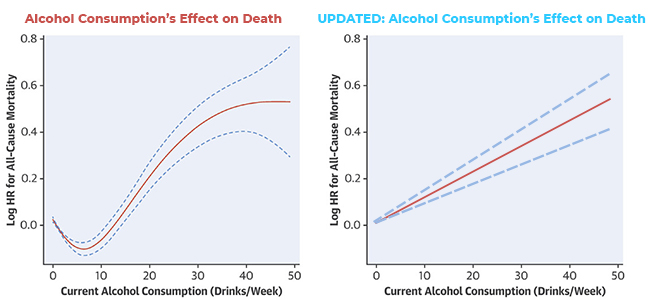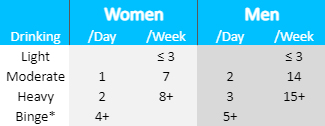Hello friends. I’m 29½ years old and I’ve never consumed alcohol. I’m assuming my mom didn’t consume alcohol either while I was in the womb for 9 months putting me over 30 years without alcohol. At least I think my mom didn’t drink while she was pregnant with me. Mom? You didn’t drink while you were pregnant with me, right? Mom?! No, I trust her. She wouldn’t do that with her favorite child. Maybe with my sisters but not me. Anyways, I thought it’d be useful to detail why I’ve never consumed alcohol, what is moderate alcohol consumption, how does it affect not only our health but our happiness, and what it’s like living alcohol-free in a world that can revolve around drinking. We have a lot to cover. Let’s get into it!
Being Raised in an Alcohol-Free House
I was raised in an alcohol-free house. I’ve never seen my dad consume alcohol and I’ve only seen my mom consume it about five times over my lifetime, usually at weddings. We never went to bars. I never saw my grandparents drink alcohol. And there was rarely any alcohol at any of our family birthday parties or holiday celebrations. It was just non-existent in my life. I mean I knew about its harms from my parents talking to me about drinking and driving accidents and avoiding parties with underage drinking but other than that, it didn’t exist. In my head, I knew it was dangerous just like tobacco and many other drugs, so I avoided it and never thought much about it. But what seems odd now is how little it was talked about in school. Sure, I remember taking that D.A.R.E. To Be Drug-Free challenge in school. Like any challenge I took it more seriously than most 😂. But alcohol was mostly talked about in terms of drinking and driving, and underage drinking. It wasn’t talked about as harmful in the way heroin, cocaine, or meth were talked about. And as I’ve learned increasingly more about alcohol, I still can’t understand why.
The Harm Alcohol Causes
A multicriteria decision analysis was published in The Lancet in 2010 that attempted to determine the most harmful drugs. It did this by analyzing each drug’s effects on two main categories. 1) Harm to its users which included dependence, disease, death, loss of personal items, and loss of relationships. And 2) Harm to others which included injury, crime, family adversities, and community harm. And what they found was that alcohol turned out to be the most harmful drug studied over the likes of heroin, cocaine, meth, and tobacco in totality. And it was by far the most harmful drug to others. Why is that?

Well, there’s numerous reasons but here are a couple. First, as was mentioned in our school D.A.R.E. program, 30% of driving fatalities involve alcohol. Despite everyone knowing the dangers of drinking and driving while sober, decision making gets degraded with alcohol and this becomes more common than it should. Second, alcohol is one of the leading causes for divorce. In a 75-year observational study on Harvard men, it was determined that 57% of divorces among the men involved alcoholism. Not only does alcohol end marriages, but it can also put a strain on relationships and family members. Now, you might be thinking that it’s possible to consume alcohol without harming others. Maybe you’re a moderate alcohol consumer who’s heard that some alcohol consumption can actually help prevent heart disease and extend life. Maybe it’s not such a terrible thing.
Moderate and Excessive Drinking
Previous studies have published findings showing that moderate alcohol consumption can prevent heart disease and decrease risks of mortality. As you can see from the chart below on the left, consuming one drink per day was found to be better than none in terms of risk for mortality. And this was hailed by alcohol companies, news outlets, and alcohol consumers who now believed alcohol can have a positive effect in moderation. But new research has found a critical error in previous studies that didn’t control for the sick quitter effect. The sick quitter effect is when people are sick, possibly from alcohol consumption, and then quit consuming alcohol for the betterment of their health or they have an underlying disease that prevents them from drinking in the first place. Either way, since they’re already sick their risks for death are naturally higher than those people who aren’t sick but still consume alcohol. But, once you control for the sick quitter effect, you get results that look more like the chart below on the right. A dose dependent effect for alcohol consumption on mortality. The more alcohol you consume, the greater the risk of dying.

These findings led to new research posted in The Lancet in 2018 where The Global Burden of Disease stated that no amounts of alcohol can be considered safe. With that being said, I think it’s also important to set the record straight on moderate alcohol consumption. The CDC defines this as one drink per day for women and two for men equaling seven drinks and fourteen drinks per week, respectively. Anything beyond this is considered heavy drinking and if you were to consume at least four drinks within 2-3 hours as a woman, or five drinks for men, this would be binge drinking. Which surprisingly is reported to be performed by 27% of people in the United States within the past month. Wow… to think that more than a quarter of the United States is binge drinking monthly is staggering to me.

Alcohol’s Effect on Health and Happiness
Now you may still be thinking that moderate amounts of alcohol can’t be that bad for your own health and happiness. I mean alcohol is commonly served at celebrations and parties. It’s thought of as a symbol for an enjoyable time. But Scott Galloway addressed this thought in his book The Algebra of Happiness. In this book he also looked at the Harvard Medical School Grant Study that followed men for 75 years of their life. And what Scott stated in his book from his analysis of the Grant Study is that “The presence of one thing in a man’s life predicted unhappiness better than any other factor: alcohol. It led to failed marriages, careers coming off the tracks, and bad health.” And I think this point can’t be overstated. Alcohol can bring short-term pleasure through the release of dopamine. It can make you feel good while you’re drinking it. But over the long-term, on average alcohol reduces your level of happiness. It increases your risk for depression. And it can lead to dysthymia which is a mild condition where you lose your interest in normal daily activities. And not only is alcohol toxic for our mental health, but it eats away at our physical health to. To list a few:
My Life Without Alcohol
So, knowing that no amounts of alcohol will make me safer, healthier, or happier, I haven’t found a reason to start drinking. But I thought I’d share a few of my alcohol-free experiences over the past decade in case it provides a more personal perspective. Entering college, I was worried about peer pressure especially being on a sports team that was likely to have parties. I figured I’d get shunned from events and the team if I didn’t participate which is why I avoided the parties. But on a team trip over spring brink there was a party and no real way of avoiding it. I was in another state, and I had no other place to be. And surprisingly, when I made it clear that I wasn’t drinking, the peer pressure went away. Once everyone realized how firm I was on my intentions, everyone was ok with it. And that was not only surprising, but cool. So instead, I gave into the peer pressure of playing their drinking games with Sprite which wasn’t the best experience. Eventually, I left the party early with a few friends, so I didn’t miss the ending of The Bachelor. What can I say, it’s a great show!
Since then, I still do tend to avoid situations where alcohol is present. In my experience, these situations just haven’t been as fun for me. I’ve found that when alcohol is present, it seems as though 30% of the conversation revolves around people’s favorite drink, their drinking stories, and what they’re going to order next. As someone who doesn’t drink, I’ve just found it hard to relate to most of the conversations. I’ve also noticed that the more people drink, the less intelligent and eloquent they become. And I understand how many people can see the benefit in “letting loose,” being goofier, and having more fun so I’m not trying to be a debbie downer… but from my perspective it feels as though I’m talking to people who are losing my favorite qualities in humans… their wit, their sharpness, their intelligence. It feels as though I’m watching someone unknowingly downgrading their cognitive functioning. And I know this may not be the best way to view this situation, and it may be fairly unrelatable, but yea… those are a few of my firsthand experiences living an alcohol-free life. It makes me appreciate my alcohol-free parent’s house and family parties.
Final Thoughts
What you do with this information is up to you. I don’t care if you drink or not. But from a scientific perspective on health and happiness, there’s no amount of alcohol that’s safe. Alcohol consumption has a dose dependent effect on mortality, cancer, and liver disease. It’s also likely to increase your risk for depression, and divorce. And from my perspective, I just can’t find any reasons why someone should start or increase their use of alcohol. But hey, what do I know? I’ve never tried it. So, cheers to another 30 years alcohol-free.
Looking for the top three things I’ve read, watched, and listened to this week? Check out my free health kit and weekly newsletter.
Watch a YouTube Video Summarizing the Post

Hey, I am Brandon Zerbe
Welcome to myHealthSciences! My goal has always been to increase quality-of-life with healthy habits that are sustainable, efficient, and effective. I do this by covering topics like Fitness, Nutrition, Sleep, Cognition, Finance and Minimalism. You can read more about me here.
Sources:
- Is It Better to Drink a Little Alcohol Than None at All?
- Wikipedia – Grant Study
- Decoding Keys to a Healthy Life
- CDC – Alcohol FAQ
- CDC – Glossary Alochol
- CDC – Alcohol and Cancer
- Relationship of Alcohol Consumption to All-Cause, Cardiovascular, and Cancer-Related Mortality in U.S. Adults
- Drug Harms In The Uk: A Multicriteria Decision Analysis
- The 25 Most Dangerous Drugs May Not Be What You Think
- Grant Study
- The ‘Sick-Quitter Effect’: Potential Bias In Studies On The Health Effects Of Alcohol
- No Alcohol Safe To Drink, Global Study Confirms
- Alcohol Use in the United States
- The Algebra of Happiness: Notes on the Pursuit of Success, Love, and Meaning
- Effects of Alcohol on the Body & Mind
